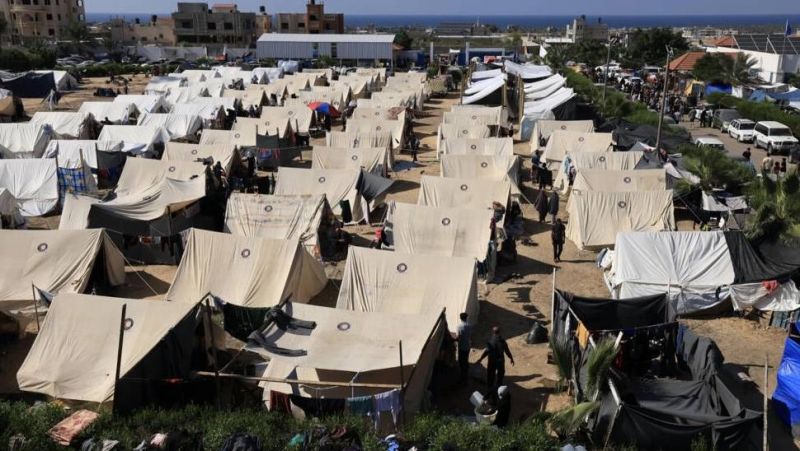
Tents at an UNRWA center in Khan Younes, in southern Gaza Strip, accommodate refugees from the northern part of strip on Oct. 19, 2023. (Credit: Mahmud Hams/AFP)
“Make it clear there is no hope of returning”: This is the aim of the Israeli Intelligence Ministry’s proposed plan for the Gaza Strip. According to a document leaked on Saturday to the Hebrew-language news website Mekomit (Local Call), moving Gaza’s population to Egypt’s Sinai Peninsula is the favored post war option in all scenarios considered by the ministry.
The intention is to turn the Camps housing almost 2.4 million Gazan refugees into permanent settlements.
All of this lends credence to the accusations leveled against Israel for its desire to forcibly displace the Palestinian population, with many going so far as to accuse the state of Genocide.
Multi-stage plan
The ministry confirmed the authenticity of the leaked document which was translated into English by +972 Magazine.
The document was drafted on Oct. 13, less than a week after Hamas’ deadly attack. Hamas’ attack on Oct.7 left almost 1,400 dead, resulted in the taking of over 230 hostages and provoked an unprecedented deluge of Israeli strikes on the Gaza Strip, which has been under Hamas’ control since 2007.
In response to the attack, the Israeli Intelligence Ministry recommended a multi-stage plan that involved taking measures to ensure that Gaza’s population evacuates to the south.
The ministry’s recommendation in the leaked letter matches the order given on Oct. 13, warning over a million Palestinians to flee the north of the enclave, which has been under a total blockade since Oct.9.
“Anyone who chooses not to leave from the north of the Gaza Strip to south of Wadi Gaza could be determined an accomplice to a terrorist organization,” warned the Israeli army on Oct. 22.
The document goes on to detail a full occupation of the Gaza Strip following a ground operation and the “cleansing of the underground bunkers of Hamas fighters.”
On Friday evening, the Israeli army launched a ground operation on Gaza and intensified its air strikes. “We will destroy the enemy above and below ground,” warned Israeli Prime Minister Benjamin Netanyahu on Sunday, claiming that the war had entered its “second phase.”
While the plan seems to coincide with Israel’s military strategy so far, the proposal to move the Palestinians to Egypt with no possibility of return could be the main obstacle to its implementation. Besides being a source of fear to Palestinians, this suggestion is of concern to the Arab community.
Refusing to be complicit in a new Nakba (catastrophe), Egypt and Jordan have firmly opposed population displacement, which could directly impact their own security.
King Abdullah II of Jordan called the suggestion of forced permanent displacement a “red line” that should not be crossed. Egyptian President Abdel Fattah al-Sisi, who is facing an acute economic crisis at home, said “Egypt’s national security is my first responsibility and I will not neglect it under any circumstances.”
Cairo already refused such a proposal in the past. Over a call, Sisi and US President Joe Biden discussed the importance of “ensuring that Palestinians in Gaza are not displaced to Egypt or any other nation,” wrote Biden on X (formerly Twitter) on Sunday.
Biden had also warned Israel in a televised interview on Oct. 15 that a new occupation of the Gaza Strip would be a “big mistake.”
This is one of the reasons the Intelligence Ministry, which admitted that the option would not have international legitimacy, also talked about a communication campaign targeting Israel’s international partners, as well as the Palestinians in Gaza.
The letter detailed a plan to present the population transfer in a way that does not “vilify Israel,” and utilizes the argument that it could reduce the number of civilian casualties in Gaza.
Washington could thus put pressure on Egypt to take in refugees from Gaza, while Europe and Canada could welcome them on their soil.
The ministry also detailed its strategy to address Gazans about the forced displacement.
“The image needs to be, ‘Allah made sure you lose this land because of Hamas’ leadership — there is no choice but to move to another place with the assistance of your Muslim brothers,” said the ministry’s document.
Downplaying the document
It would take a lot to convince the international community to support the implementation of such a plan, which the Israeli authorities have downplayed.
The Prime Minister’s office told Haaretz, “this is an initial document of the kind that can be found in dozens of iterations at all levels of the government and the security services. The issue of ‘the day after’ has not been discussed at any official forum in Israel, which is now focused on eliminating Hamas’ governmental and military capabilities.”
The Intelligence portfolio held by Gila Gamliel, a member of Benjamin Netanyahu’s Likud party, produces public policy opinions and shares them with the relevant services, the army and other ministries, “but are not binding,” explained +972 magazine.
The media outlet considered that Gila’s influence is relatively weak, because she is not responsible for the government’s intelligence agencies.
An anonymous source familiar with the draft told Haaretz that the text was not supposed to be debated within the cabinet and that the Intelligence Ministry did not have the authority to take such a decision.
The document nevertheless proves that post-Hamas scenarios in Gaza are being considered in Israeli power circles. The draft itself presents two other options, which it does not however, recommend.
The first is to authorize the PA, led by Fatah, which was expelled from Gaza following war with Hamas in 2007, to regain control of the Gaza Strip under Israeli auspices.
According to the ministry, this solution would be the most dangerous, as it could lead to the creation of a Palestinian state, particularly since “there is no way to maintain an effective military occupation” in the absence of Israeli settlements.
The second option is to allow another local Arab authority to emerge as an alternative to Hamas. The document indicated that this option runs the risk of empowering an even more radical authority.
These two solutions are therefore described as undesirable from the strategic and security points of view and would not send a sufficiently strong message of deterrence, particularly to Hezbollah, the ministry concluded.
This article was originally published in French in L'Orient-Le Jour. Translation by Joelle El Khoury.



